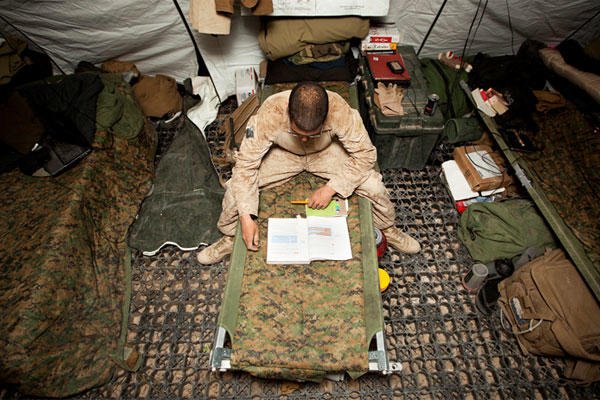The Marine Corps has halted new enrollments for popular tuition assistance programs that now serve several thousand troops earning high school, college, and graduate school credits on their own time in a cost-cutting move brought on by the sequestration spending reductions.
Veterans groups feared that the action by the Marines would soon be followed by the other services and also impact several hundred thousand current enrollees in the military's Voluntary Education Tuition Assistance programs.
The Marines stopped enrolling new students for the aid after Navy Secretary Ray Mabus issued a lengthy directive on Saturday that ordered the halt to tuition assistance along with other cost cutting moves made because of sequestration. The announcement was issued to all sailors on March 2.
The assistance had been available for active duty Marines using their own time to attend high school completion courses, vocational courses or classes toward an associate, bachelor, master or doctorate degree.
The Navy, Air Force and Army have similar programs that provide up to $4,500 per fiscal year in tuition assistance, or $250 per semester hour or credit hour.
Marine Corps officials and spokesmen could not immediately provide figures on how many Marines are currently taking advantage of tuition assistance and how much the programs cost.
The tuition assistance provided by the military, along with the post 9-11 GI Bill for college and graduate assistance administered by the Veterans Affairs Department have been popular with troops and cited by the Defense Department as main assets for recruitment and retention.
The GI Bill was not affected by the Marines' action and President Obama has pledged that all VA programs would not be subject to the sequester cuts.
The Army alone has more than 201,000 active duty, Army Reserve and National Guard soldiers now receiving tuition assistance at an annual cost of about $353 million, according to the Army's Continuing Education Division of the Human Resources Command.
In his own message to all Marines, Gen. James Amos, the Marine Commandant, stressed that the Marines would focus on readiness and that other programs might be curtailed or scrapped to meet the sequester cuts that will trim about $1.4 billion from the Marines' budget this year.
"As the nation's Crisis Response Force, we have a statutory responsibility to be the most ready when the nation is least ready," Amos said in his message. "In order to ensure our continued readiness, we must make sacrifices in other areas."
Veterans groups said they feared that the Marine cessation of tuition assistance enrolment was a precursor for other spending drawdowns that will impact morale.
"It's just the beginning in the curtailment or even the ending of the 'people programs' that the military provides," said Joe Davis, a spokesman for the Veterans of Foreign Wars.
Davis said the VFW expected that the other services would follow suit and curb their own tuition assistance programs.
"It's an unfortunate reality right now," Davis said. "The military preaches higher education from day one – it's a right of passage for higher rank – and now they're cutting the programs."
But on Tuesday, the Defense Department's comptroller's office released guidance directing all the services to consider "significant reductions in funding new tuition assistance applicants for the duration of the current fiscal situation."
Michael Dakduk, a Marine veteran and now executive director of the Student Veterans of America, said he used tuition assistance to earn college credits prior to leaving the Marine Corps.
"This benefit helped me attain the coursework necessary to successfully transition from combat to college and eventually complete my baccalaureate degree," he said in a statement.
"I am disappointed to hear that the Marine Corps was forced to make the tough decision of discontinuing the future enrolment of Marines into the TA program," Dakduk said. "This is especially troubling given the number of Marines expected to leave active service in the coming years and the incredible value placed on higher education in today's job market.



























